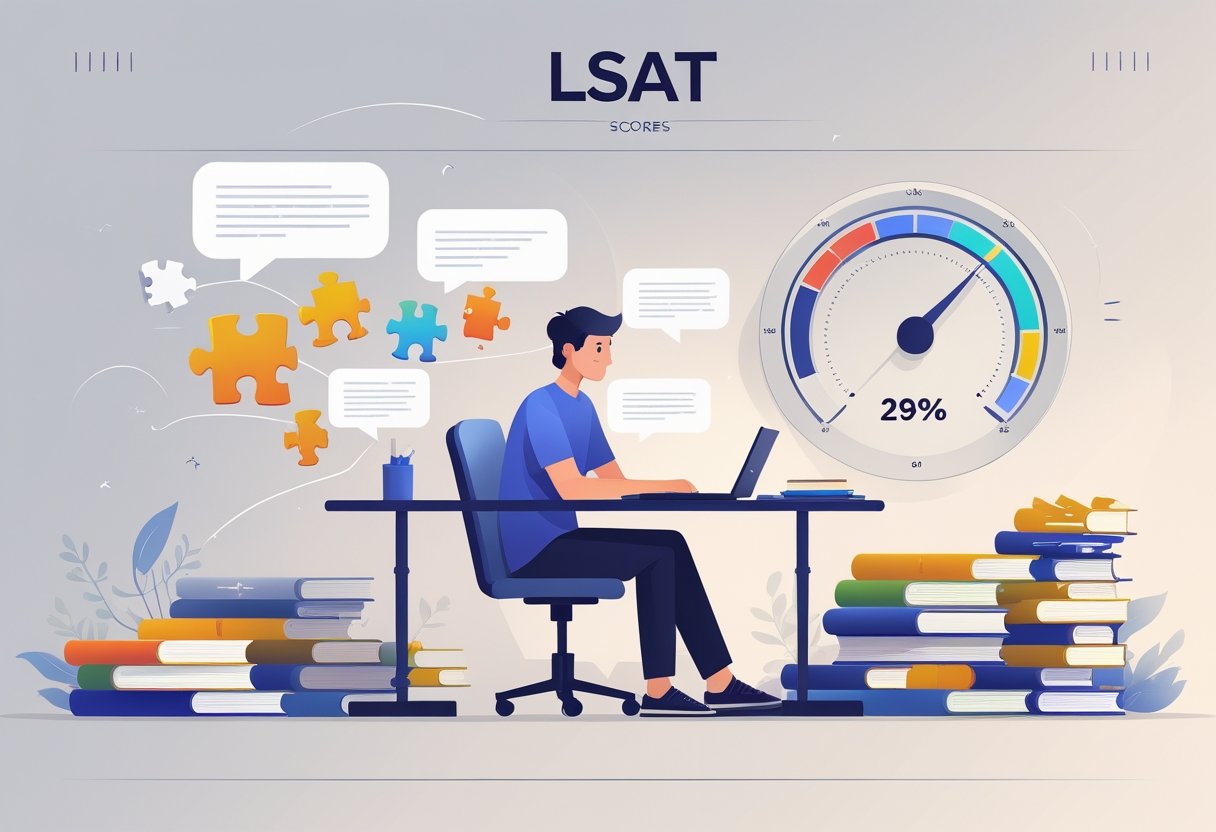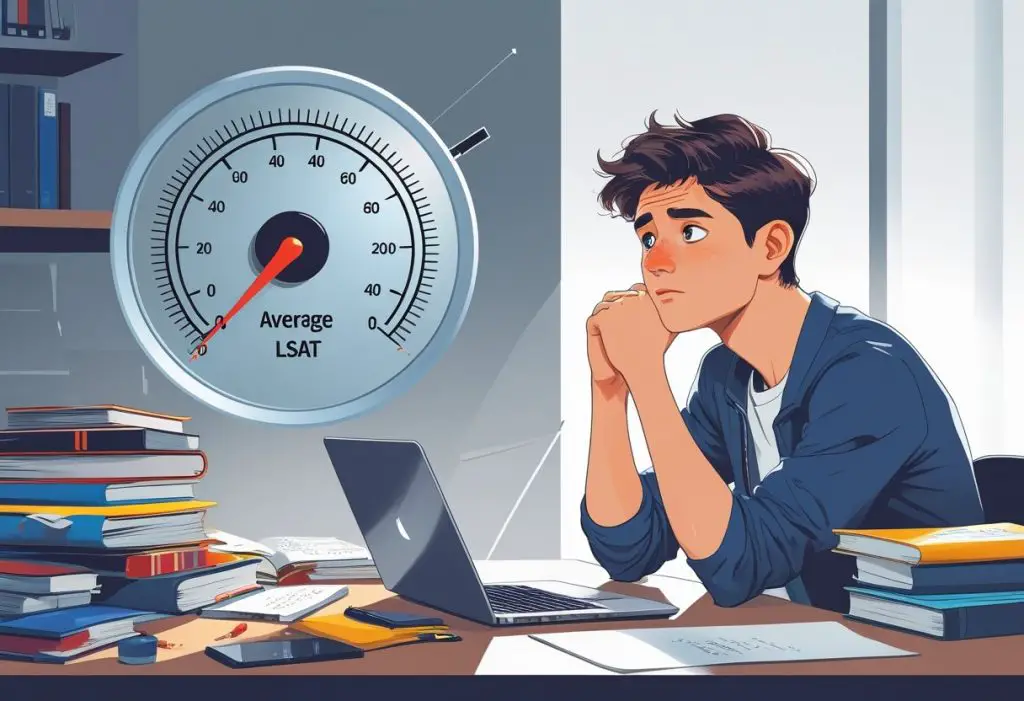Many people wonder what the average LSAT score without studying looks like before they start their prep. Most test-takers who take the LSAT without studying score around 150, which is right in the middle of the 120-180 scale.
Knowing the average LSAT score without studying helps you understand what to expect and how much you may need to prepare. This can also help you decide if skipping prep is a risk worth taking for your law school goals.
Key Takeaways
- Most people score about 150 on the LSAT without studying.
- Understanding LSAT scoring can set realistic expectations.
- Law schools expect higher scores than the average score without prep.
What Is The Average LSAT Score Without Studying?
Most people who take the LSAT without any preparation receive results close to the national average, but their scores can vary based on several factors. Research data and score conversion tables give a clearer picture of what to expect if you attempt the Law School Admission Test without studying.
Typical Raw Scores for Unprepared Test Takers
If you take the LSAT without studying, your score will likely fall between 140 and 148. The LSAT is scored from 120 to 180, with 120 being the lowest possible score. The national mean LSAT score usually sits near 151-152.
A raw score is simply the number of questions you answer correctly out of about 75-76 graded questions (excluding the experimental section). With random guessing, you might get about 50% correct, which is around 38 out of 75. That converts to a scaled score in the mid-to-high 140s using the LSAT scoring table.
Factors That Influence Baseline LSAT Performance
Your baseline LSAT performance without prep can depend on several variables. Reading comprehension skills, ability to analyze logic, and comfort with standardized test formats all affect your raw score. Test anxiety or unfamiliarity with timing can also lower your results.
Some people naturally understand the test’s logic games or reading passages better than others. If you have a strong academic background, especially in reading and logical thinking, you may score slightly higher even without studying. Still, scoring much above 150 without prior exposure is rare.
Statistical Insights From National Research
Data collected by the Law School Admission Council (LSAC) shows a clear pattern. Most test takers’ scores cluster near the average even if they don’t prepare, with very few unprepared takers exceeding 155.
A national research study found the following results:
| Score Range | Percent of Unprepared Takers |
|---|---|
| 140-145 | 40% |
| 146-150 | 35% |
| 151-155 | 20% |
| 156+ | 5% |
These findings suggest you should expect a score in the mid-140s if you take the LSAT cold. Preparing is the most effective way to increase your score above this typical range.
Understanding LSAT Scoring and Test Sections

The LSAT test uses a scaled scoring system from 120 to 180. Each multiple choice section measures a different skill, such as logic or reading. There is also an unscored experimental section, and a separate writing section.
Multiple Choice Sections Overview
The LSAT test has four main sections that count toward your score. These include one Reading Comprehension, one Analytical Reasoning (also called Logic Games), and two Logical Reasoning sections. Each section is multiple choice.
You will also face a fifth section that doesn’t count toward your score. This is the experimental section. It can be any one of the multiple choice section types, but you won’t know which one is experimental.
You get about 35 minutes for each of these sections. All questions have the same value, so each correct answer helps your total score.
The Role of Analytical Reasoning and Logic Games
The Analytical Reasoning section, often called Logic Games, tests your ability to make deductions and organize information. You’ll get short puzzles with rules and a set of questions for each. An example might involve seating people in a row with certain restrictions.
Skills tested here:
- Making deductions
- Identifying relationships
- Working through complex setups
Logic Games can look complicated at first but reward clear thinking and organization. The section usually contains four games, each with 5–7 questions.
Logical Reasoning and Reading Comprehension Challenges
Logical Reasoning sections measure your ability to analyze arguments, spot flaws, and conclude. These sections make up about half of your total score. You’ll read short passages and answer questions about what’s being argued and how it’s being supported.
Reading Comprehension focuses on your ability to understand and interpret longer texts. You’ll get four passages, each followed by several questions. The passages cover different subjects, including law, science, and the humanities.
Both sections challenge you to find main ideas, infer meaning, and evaluate reasoning. Reading quickly but carefully is important.
How LSAT Scores Without Studying Affect Law School Admissions

Your LSAT score carries weight in law school admissions. Scoring low without studying may affect your chances at certain schools, your ability to get scholarships, and your predicted performance in law school.
LSAT Scores as Predictors of Law School Success
The LSAT is designed to measure skills needed for law school, like reading comprehension, logical reasoning, and analytical thinking. Admissions committees use this test to compare applicants from different backgrounds.
If you take the LSAT without preparation, your score might not reflect your true abilities. A low score can suggest to admissions officers that you may struggle in their programs. Many law schools rely on LSAT scores, along with GPAs, as the two main predictors of how well a student will do.
Your chances of getting into a “top” law school may drop sharply with a below-average score. Prepared or not, the LSAT is a standardized tool, so your results are compared against thousands of other test-takers each year.
Correlation With GPA and Law School Grades
Many schools use regression analyses to study the relationship between LSAT scores, undergraduate GPA, and law school grades.
The correlation between LSAT scores and first-year law school grades is moderate. Research shows LSAT scores usually predict law school grades slightly better than GPA alone.
Here’s a simple comparison table:
| Factor | Correlation With Law School Grades |
|---|---|
| LSAT Score | Moderate |
| Undergraduate GPA | Slightly lower |
| Both Combined | Strongest |
Schools often view both LSAT and GPA together to make admission decisions. Weakness in one area (like a low LSAT) can sometimes be offset by a strong GPA. Still, low LSAT scores gained without studying can hint at lower potential for academic performance in law school classes.
Impact on Admissions and Scholarship Opportunities
Law school admissions officers usually look for a “good” LSAT score, often above the median for their program. A below-average score, especially from not studying, can put you at risk of being rejected by more competitive schools.
Scholarship opportunities also depend on your test score. Financial aid packages and merit scholarships are often reserved for those with higher LSAT results. Without a strong score, you might pay full tuition or get less aid.
Some law schools may still admit applicants with lower scores if other parts of their application stand out, but your chances are lower. Data from many law schools shows that higher LSAT scores often lead to more acceptance letters and bigger scholarship offers.
Comparing LSAT Preparation Approaches and Outcomes
Different ways to prepare for the LSAT lead to very different scores and experiences. Some people use formal LSAT prep courses, while others rely on practice tests or official prep materials.
Difference in Scores: No Prep vs. LSAT Prep Courses
If you take the LSAT without studying, your score will likely be close to the average raw score, often around 150 out of 180. Most test-takers who do not prepare score in the 145–153 range.
LSAT prep courses, such as The Princeton Review and Kaplan, can help raise scores by teaching strategies, focusing on weak areas, and providing realistic practice. Some students who take high-quality courses may see their scores go up by 5–15 points.
Here’s a simple comparison:
| Preparation Type | Typical Score Range | Score Increase |
|---|---|---|
| No Preparation | 145–153 | — |
| Prep Course | 155–165+ | 5–15 points |
Better scores often mean more law schools and scholarships become available to you.
Practice Tests and Official LSAT Prep Resources
Practice tests help you get used to LSAT question types and time limits. Taking official LSAT practice tests, especially those released by LSAC and free options from Khan Academy, can boost your comfort and accuracy.
Using both timed and untimed practice tests lets you spot where you make mistakes and track improvement. Most experts say you should take several full-length tests before the real exam.
Official resources and practice from real test questions matter more than just reading review books. They match the format and logic of the actual LSAT.
Influence of Study Time and Endurance
Your score can depend on how much you study and your test endurance. Studying a little each week for several months usually works better than trying to cram in a few days.
Endurance is important. The LSAT is about three hours long, so building concentration by taking regular, full-length practice tests helps your mind and body adjust to the stress.
Many students who increase their study hours over 2–3 months see steady improvement. Small, regular study sessions tend to build stronger skills than occasional, long study periods.
Alternatives to the LSAT: GRE and Other Standardized Tests
Some law schools accept the GRE as an alternative to the LSAT. The GRE tests different skills, such as math and vocabulary, so your strengths may change which test is better for you.
If you have taken other standardized tests like the SAT or ACT, you probably have some idea of how you handle test days and study plans. This could help you choose between different law school tests or focus your studies.
Not every law school takes the GRE, so check with each school before deciding. Some students find the GRE format friendlier or less stressful than the LSAT.
Frequently Asked Questions
Taking the LSAT without studying often leads to lower scores, which can impact your chances of getting into law school. Most first-time test takers score near the average, but preparation usually helps improve these results.
What is considered a good LSAT score for someone who hasn’t studied?
A typical unprepared test taker scores between 145 and 153. A score above 150 without studying is seen as decent by many test-takers. Most top law schools look for scores much higher than this range.
Can you achieve a competitive LSAT score on the first attempt without preparation?
It is unlikely to get a highly competitive score like 160 or above without studying. Most people need some preparation to do well. Without preparation, your first attempt likely reflects only your raw skills.
What are the typical results of taking an LSAT practice test without prior studying?
You will probably get a score near the national average, which is about 150. Many people find logic games and reading comprehension sections tough without practice. Your performance can reveal your current strengths and weaknesses.
How does an average LSAT diagnostic score compare to one with adequate preparation?
Most people improve their scores by at least 5 to 10 points after studying. Without preparation, your score is usually lower than it could be after some practice and review. Studying helps you understand question types and test strategies.
Is it advisable to take the LSAT without any prior studying, and what might the outcomes be?
Taking the LSAT without studying is not recommended if you want to get into a good law school. Low scores are harder to improve in later attempts due to some schools’ policies on multiple scores. Preparation gives you a better chance of reaching your target score.
What impact does not studying have on your LSAT score compared to those who do study?
People who study for the LSAT usually score higher. Not preparing can keep your score around the average mark or just above it. Those who prepare can reach scores needed for more selective schools.

